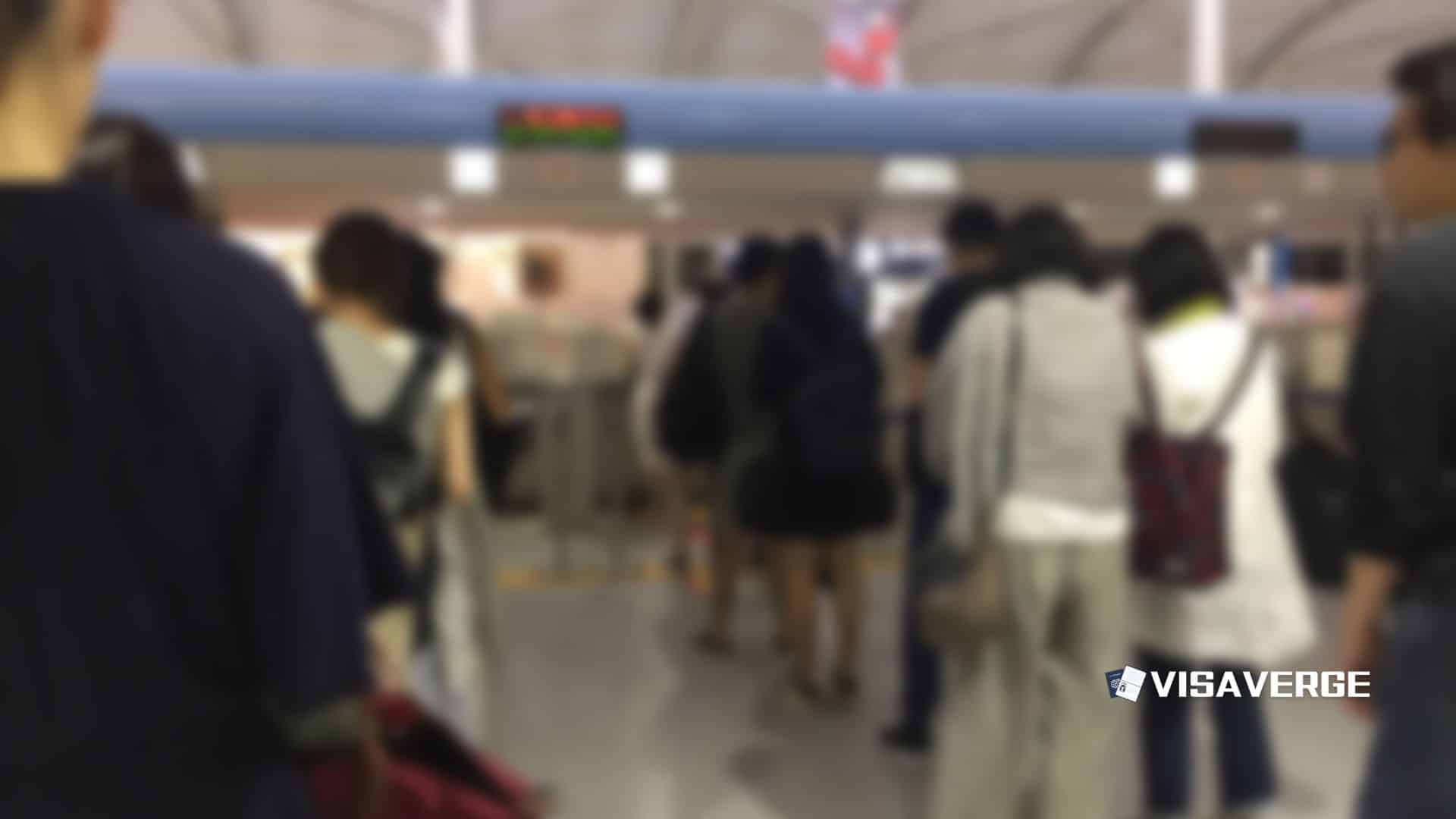(NORTHERN MASSACHUSETTS) The northern Massachusetts immigration court is now among the most understaffed in the country, after a wave of resignations and firings pushed the docket to a breaking point in mid-2025. As of August, immigrants with cases at this court face waits of several years for hearings. The logjam comes as the national immigration court backlog has topped 3.5 million pending cases, according to court data cited by legal groups and confirmed by union figures.
The Department of Justice (DOJ) deepened the strain in July 2025 when it fired 17 immigration judges across 10 states, including Massachusetts. The judges’ union called the move “without cause,” and said it fit a broader pattern under President Trump. The Executive Office for Immigration Review (EOIR), which runs the courts, has not filled most of the open seats, and the hiring pipeline has slowed at the very moment demand is rising.

Matt Biggs, president of the International Federation of Professional and Technical Engineers, which represents immigration judges, said in a statement, “It’s outrageous and against the public interest that at the same time Congress has authorized 800 immigration judges, we are firing large numbers of immigration judges without cause.” Union officials estimate that only about 600 judges are currently on the bench.
U.S. Senators Michael Bennet and John Hickenlooper joined colleagues in pressing the Trump administration to explain the terminations and to outline a plan to reduce the backlog. Their offices warned that roughly 700 additional judges would be needed to clear pending cases by 2032. Many of the judges let go were reportedly appointed under President Biden, deepening political tension around the courts and raising questions about continuity and independence.
Staffing cuts ripple through the docket
EOIR has declined to publicly explain the staffing reductions or provide a timeline for replacements. The agency’s hiring process can take up to one year from recruitment to training, a delay that leaves the northern Massachusetts immigration court short-handed for another cycle of hearings.
With too few judges, clerks are pushing routine merits hearings far into the future, while urgent filings compete for scarce calendar time. Attorneys report that emergency motions and requests to expedite are rarely granted unless tied to a clear humanitarian need, such as urgent medical care or a child’s welfare.
Routine case updates now linger for months before any response. EOIR reminds parties to keep filing through its electronic system or by mail, but those filings do not translate into timely dates when the court lacks people to read the record and set hearings. For official contact details and notices, readers can check the EOIR’s Office of the Chief Immigration Judge page at https://www.justice.gov/eoir/office-of-the-chief-immigration-judge.
Court observers say the northern Massachusetts immigration court, like many across the country, is trying to handle more with less. Beyond trial-level judges, appellate immigration judges and administrative staff also face cuts, according to union and advocacy reports. Inside the remaining courtrooms, judges describe pressure to move faster under new case-completion goals and deadlines imposed by policy, even as dockets swell and representation gaps widen.
Key point: The combination of firings, slow hiring, and new quotas is leaving courts strapped for capacity just as demand rises.
Impact on immigrants and the legal community
The immediate effect is stark: due process delayed. With hearings set years out, witnesses move, evidence goes stale, and families live in limbo.
Lawyers in Massachusetts warn that rushed timelines and production quotas may hurt the quality of decisions, increasing the risk of mistakes and wrongful removals. Advocacy groups say the system now expects people to win high-stakes cases with less time, less help, and fewer chances to be heard.
Legal aid organizations point to reduced court-funded legal advice and “know-your-rights” resources. Limits on the time allowed for asylum seekers to find a lawyer add to the strain, leaving more people to face trained government counsel alone. In some instances, Immigration and Customs Enforcement has increased arrests in and around courthouses, including soon after case dismissals. Attorneys describe chilling effects on attendance and cooperation when clients fear being detained the moment they step outside a courtroom.
Former judges and legal scholars argue the firings will do the opposite of what the administration says it wants. If the goal is faster, fairer results, they say, removing experienced jurists without replacing them is “nonsensical.” Groups such as HIAS and the American Immigration Lawyers Association have urged the Department of Justice to:
- fill vacancies quickly
- expand access to representation
- scrap quotas that push judges to cut corners
The Trump administration says the changes are meant to speed removals and enforce the law, but it has not released a detailed replacement plan for the northern Massachusetts immigration court.
Human toll and broader consequences
For people with cases in northern Massachusetts, delays have concrete consequences:
- A lawful permanent resident convicted of an old offense may wait years to ask for relief.
- An asylum-seeking parent could spend four or five school years telling a child, “We still don’t know.”
- Employers who sponsor workers may see employees pause travel or pass on promotions while awaiting a judge’s decision.
The stress spreads across classrooms, workplaces, and neighborhoods. Without quick hiring, the backlog is expected to grow further; lawmakers say that at current capacity, cases could stack up until at least 2032.
EOIR leaders have signaled that more staff cuts could come, citing concerns about prior hiring practices. Lawsuits by fired judges and advocacy organizations are moving forward, and that litigation could affect whether more firings occur and how soon replacements arrive.
Funding versus reality
Congress recently set aside $3.3 billion for the immigration courts as part of a broader $170 billion enforcement package. However, money on paper does not mean new judges in courtrooms tomorrow. Recruiting, vetting, and training take time, and departures keep outpacing arrivals.
According to analysis by VisaVerge.com, the gap between authorized seats and active judges remains wide even after new funding, leaving places like northern Massachusetts with little immediate relief.
Staffing snapshot (high-level)
| Item | Figure |
|---|---|
| Authorized immigration judges | 800 |
| Estimated active judges (union estimate) | ~600 |
| National backlog | 3.5 million+ cases |
| Congressional funding for courts | $3.3 billion |
| Broader enforcement package | $170 billion |
Practical guidance for people with cases
For now, people with open cases should plan for extended timelines and keep records current. Practical steps include:
- Expect long waits. Hearing dates may land years out.
- Check case status regularly. EOIR’s automated line is 800-898-7180.
- Keep your address updated with the court to avoid missed notices.
- File on time through EOIR’s electronic system or by mail, and keep stamped copies.
- Ask about expedited review only if there’s a clear medical or safety reason.
- Seek legal help early, as free resources are stretched and time limits apply.
- Plan for courthouse safety, including a post-hearing pickup plan if you fear detention.
Warning: Missing notices or failing to update contact information can lead to critical consequences when hearing dates are eventually set.
What’s next?
The coming months will test whether hiring can catch up and whether policy will shift toward stability. For families in northern Massachusetts, the question is not abstract: every delay means another year without closure, another birthday without answers, and another chance that a case built carefully over time will fall apart because the system ran out of time.
This Article in a Nutshell
Northern Massachusetts courts buckled in mid-2025 as mass firings left many benches empty. With 17 judges dismissed and slow hiring, hearings now wait years. The 3.5 million-case national backlog and quotas pressure remaining judges, harming due process. Affected immigrants must update records, seek counsel, and prepare for extended delays.













